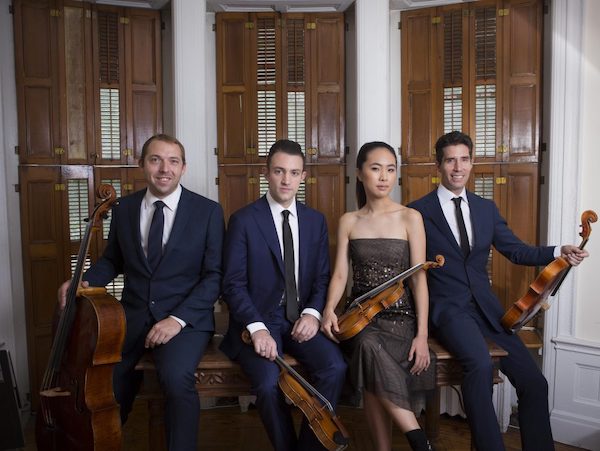Chamber Music Society avoids the usual suspects in engaging program of Mozart rarities

The line between a heavy hand and interpretive freedom is rarely so slim as when playing Mozart. More than two centuries on and plenty of instrumental innovations later, the composer’s works—with their harmonic limpidity and complexity masked as unassuming simplicity—still place even the most assured musicians under a microscope.
In lesser hands, the Chamber Music Society of Lincoln Center’s Mozart extravaganza Monday night at the Harris Theater—bookended by works featuring the French horn—might have merely shuffled along.
But the Society offered Finnish pianist Juho Pohjonen and the Escher String Quartet, two CMS regulars whose careers have quickly progressed from early-career accolades to international repute. Their interpretations were a testament to the subtler shades of brilliance necessary to bring Mozart’s music to life.
Playing together, these abundantly gifted artists drew sparks during the Piano Concerto No. 12 in the composer’s chamber version for keyboard and string quartet (here widened to a quintet with New York Philharmonic principal bassist Timothy Cobb). Often heard with CMS as a chamber partner or soloist in more offbeat repertoire, Pohjonen proved himself to be a singularly luminous Mozart interpreter. Spontaneous, stylish, and well-paced, he seemed to conjure the notes from thin air, breaking fresh, verdant ground. But, true to the thin-line principle, the actual liberties he took were tasteful yet few. Mozart’s cadenzas, with an ornament here and there, sounded strikingly fresh, pensive with an idiosyncratic lilt.
As an ensemble, the six musicians were finely balanced, even in Harris’s sprawling space. No mere orchestral cushion, the Eschers and company played to the strengths of the arrangement in an energetic and collaborative interpretation. The strings perfectly tapped into Pohjonen’s expansive phrasing in the first movement; shapely ritornellos complemented the soloist as he seamlessly wove together the different episodes of the perky third-movement Rondo.
The Eschers played the lyrical theme of the second movement with the same breadth they’d brought to Mozart’ String Quartet No. 22 in B flat major–lavishing over each phrase while maintaining the overall sweep of each movement.
The quartet interpretation felt a bit heavy and over-luxuriant at times; more urgency might have made contrasting sections like the funky third-movement trio pop a bit more. Even so, the group’s intricacy and of-the-moment musicianship still brought this late Mozart work (1790) to vibrant life. Whether accompanying or etching out the soaring solo lines of the first movement, cellist Brook Speltz played with buoyance and flexibility. First violinist Adam Barnett-Hart repeatedly drew attention for his silvery sound and evocative phrasing.
Though Barnett-Hart and Speltz usually had the meatier melodic material, second violinist Danbi Um and violist Pierre Lapointe were noticeably engaged and sensitive middle voices. Um and Barnett-Hart were wonderfully simpatico partners during their tandem melodies, and Lapointe exuded warmth in his aria-like solos throughout the piece.
Mozart’s Twelve Duos for Two Horns made for an easygoing, promenade-like opener—though perhaps not for horn players, who may balk at the pieces’ wide range and fast-moving passages. Hornist Eric Reed played the sprightly melodic lines with a big, brassy sound, but repeatedly struggled with the upper line’s technical demands. His partner Jennifer Montone was mellower in tone and presence but far more polished.
All except Pohjohnen and Cobb reunited onstage for the Divertimento in F major for Two Horns and Strings, mostly a fun romp besides an unexpectedly earnest, strings-only fourth movement. Barnett-Hart brought consummate creativity and joie de vivre to the soloistic first violin role, wringing unexpected delights out of what is functionally background music. The horns act mostly as textural garnishes; Reed and Montone were best when they were attuned to the balance established by their collaborators.
The Chamber Music Society of Lincoln Center presents music of Arensky, Barber, Bloch, and Schubert 7:30 p.m. May 1 at the Harris Theater. harristheaterchicago.org
Posted in Performances





